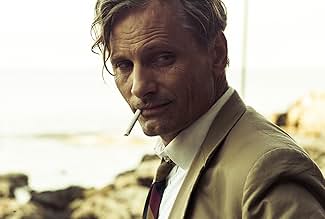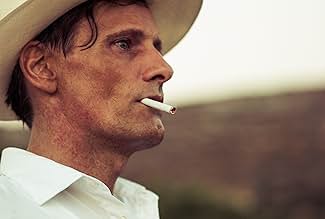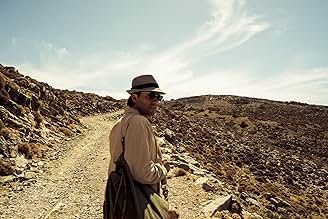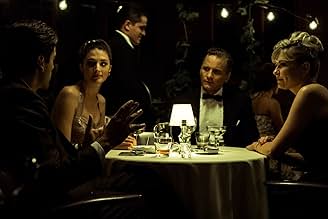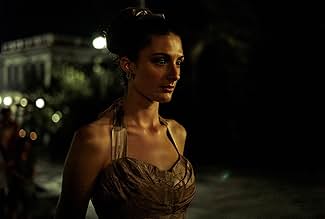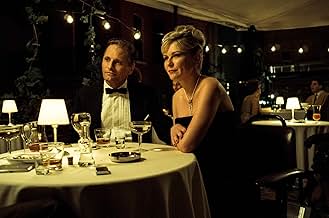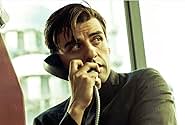VALUTAZIONE IMDb
6,2/10
34.788
LA TUA VALUTAZIONE
La storia di un truffatore, sua moglie e uno sconosciuto che fuggono da Atene dopo che uno di loro è stato coinvolto nella morte di un detective privato.La storia di un truffatore, sua moglie e uno sconosciuto che fuggono da Atene dopo che uno di loro è stato coinvolto nella morte di un detective privato.La storia di un truffatore, sua moglie e uno sconosciuto che fuggono da Atene dopo che uno di loro è stato coinvolto nella morte di un detective privato.
- Regia
- Sceneggiatura
- Star
- Premi
- 3 candidature totali
Babis Hatzidakis
- Stall Keeper
- (as Babis Chatzidakis)
Stella Fyrogeni
- Barmaid
- (as Stela Fyrogeni)
Recensioni in evidenza
I agree with an earlier reviewer that this film derives much of its effect from being set in 1962. The period feel is beautifully communicated and the plot needs to work itself out in a world where places like Athens, Crete and Istanbul were not just exotic but isolated, where holidaying Americans would still be surprised and interested to meet other Americans, and people on the run could hope to hide away. The chemistry between the three leads, who are all well played, does lack fizz and there is a clumsy and rather hackneyed third act. But the film is never less than engaging and all the better for not resorting to surprise twists. The music tries too hard to be exciting, almost as if the director thinks the visuals need some extraneous help to keep the audience interested. I think he is wrong - there is enough going on here, including some fine acting and cinematography, to appeal to audiences who like films with substance, a trajectory, and a sound sense of place and time.
A thriller centered on a con artist (Viggo Mortensen), his wife (Kirsten Dunst), and a stranger (Oscar Isaac) who flee Athens after one of them is caught up in the death of a private detective.
Not being familiar with the novel, I cannot really comment on if this is a good adaptation or not. But it definitely is not as good a film as it could be. Mostly because it starts out strong and remains strong for the first half hour before suddenly going flat and staying flat. If the film could have kept its earlier pace and tone, it would be an incredibly gripping thriller.
Kirsten Dunst is excellent and understated. Mortensen is not half bad as the con artist. But they seem trapped in this script that never fully allows them to show their potential.
Not being familiar with the novel, I cannot really comment on if this is a good adaptation or not. But it definitely is not as good a film as it could be. Mostly because it starts out strong and remains strong for the first half hour before suddenly going flat and staying flat. If the film could have kept its earlier pace and tone, it would be an incredibly gripping thriller.
Kirsten Dunst is excellent and understated. Mortensen is not half bad as the con artist. But they seem trapped in this script that never fully allows them to show their potential.
Film opens at the Parthenon in Athens. A young male guide, played by Oscar Isaac, is guiding some impressionable girls. An older couple enter the scene. The male, played by Viggo Mortensen, is mature. His younger wife, played by Kirsten Dunst, looks like Doris Day. Thus we seem catapulted into the Hitchcock era. Film is in fact set in 1962, and all scenes seem authentic.
A central theme of far too many Hitchcock films to list, is that of an innocent man caught up in events over which he has no control. In this film, however, we quickly find that Mr Mortensen's character is no innocent. He is, however, quickly thrust into events that are out of his control.
Within the central trio of characters, it is unclear what are their individual motives, or, who is trying to con who. The sexual chemistry and tensions remind of 'Knife in the Water' (1962).
Film is a true Hitchcockian-style suspense movie rather than a thriller. As the tension rises so does the music, which also is pure Hitchcockian, and could easily have been lifted in great chunks from one or more of his movies.
As the tension rises, so too does the pace. From the start, the film moves at a decent pace, but this builds as the film progresses, and the pace gets faster and faster. Great camera shots, great chases, and iconic scenes, also suggest homage to 'The Third Man (1949).
All location shooting was superb. This reviewer, once attempting to follow in the footsteps of Plato, got lost in the mountains, and had to be rescued by shepherds. So it was with a fond familiarity that I saw those same mountains.
One explanation for the Hitchcockian-feel to the movie can be explained by the fact that the film is based on a novel by Patricia Highsmith. Alfred Hitchcock's classic 1951 film 'Strangers on a Train' was also based on a novel by Miss Highsmith. Thus perhaps it may be more accurate to describe the feel and touch of the movie as Highsmithian rather than Hitchcockian. Miss Highsmith is also the origin of the 'Ripley' stories.
This flawless and faultless masterpiece of a film, is the first full-length film directed by Hossein Amini. He also wrote the screenplay.
This film will appeal to all, though the 12A certificate means that it is unsuitable for young children. Suitable for all others, it is very suitable, and it will be very much appreciated, by classicists and Hitchcock fans.
A masterpiece! 10/10!
A central theme of far too many Hitchcock films to list, is that of an innocent man caught up in events over which he has no control. In this film, however, we quickly find that Mr Mortensen's character is no innocent. He is, however, quickly thrust into events that are out of his control.
Within the central trio of characters, it is unclear what are their individual motives, or, who is trying to con who. The sexual chemistry and tensions remind of 'Knife in the Water' (1962).
Film is a true Hitchcockian-style suspense movie rather than a thriller. As the tension rises so does the music, which also is pure Hitchcockian, and could easily have been lifted in great chunks from one or more of his movies.
As the tension rises, so too does the pace. From the start, the film moves at a decent pace, but this builds as the film progresses, and the pace gets faster and faster. Great camera shots, great chases, and iconic scenes, also suggest homage to 'The Third Man (1949).
All location shooting was superb. This reviewer, once attempting to follow in the footsteps of Plato, got lost in the mountains, and had to be rescued by shepherds. So it was with a fond familiarity that I saw those same mountains.
One explanation for the Hitchcockian-feel to the movie can be explained by the fact that the film is based on a novel by Patricia Highsmith. Alfred Hitchcock's classic 1951 film 'Strangers on a Train' was also based on a novel by Miss Highsmith. Thus perhaps it may be more accurate to describe the feel and touch of the movie as Highsmithian rather than Hitchcockian. Miss Highsmith is also the origin of the 'Ripley' stories.
This flawless and faultless masterpiece of a film, is the first full-length film directed by Hossein Amini. He also wrote the screenplay.
This film will appeal to all, though the 12A certificate means that it is unsuitable for young children. Suitable for all others, it is very suitable, and it will be very much appreciated, by classicists and Hitchcock fans.
A masterpiece! 10/10!
If this movie had been made back in mid-century when Alfred Hitchcock and Stanley Donen and Billy Wilder were at their peak, it probably wouldn't get much attention. But given we're in an age where Transformers XVI is a possibility, a movie like this--taut, suspenseful, well-acted, well- written, is kind of a marvel. It doesn't promise a lot: there are no special effects, the plot twists aren't terribly surprising; in fact, nothing in the movie really surprises. But it's all so seamlessly put together, so pleasingly directed, and shot with such loving attention to the scenery, Two Faces is a real delight. Don't come with great expectations--come simply for the pure entertainment of what a movie can be when everything in it works well. (Also, it's based on a Patricia Highsmith novel, so you know that if nothing else, there will be sophistication and wit.)
An old school, Hitchcockian style thriller from the writer behind Drive, The Two Faces of January commences with sexy, mysterious intrigue, but slowly dovetails into a soggy noodle. Shot against the glorious, sun-drenched Greek landscape by cinematographer Marcel Zyskind and boasting immaculate costume and set design befitting its 1960s period, January looks a million bucks, yet this can't cover up the fact the final hour is bland and devoid of tension. One of the finest (and underrated) actors of our generation, Oscar Isaac is once again astounding despite his failing surrounds, here portraying the smooth, enigmatic operator who gets in over his head when he witnesses a crime by an attractive American couple. As the wealthy tourists with a secret, Kirsten Dunst and Viggo Mortensen are another major weakness, the duo sharing zero spark together and Mortensen in particular possessing all the charisma of a plank of wood. It's a noble directorial debut from screenwriter Hossein Amini, but remains a missed opportunity in a subgenre not visited nearly enough.
Lo sapevi?
- QuizViggo Mortensen on his character's wardrobe: "I particularly liked the white linen suit that you see in the poster that Chester wears, and in a way that's another character in the movie because the journey of that beautiful cream-colored linen suit, on the Acropolis in the sunshine in the beginning, this immaculate, perfect, fits perfectly, looks great. You see that suit at the very end of the story, and that suit's been through it, it's a bit torn, it's frayed, it's not as clean as it was, it's suffered almost as much as the man wearing the suit."
- BlooperIn the beginning Rydal recounts the legend of Aegeus on the steps of the Acropolis and says that it was there that Aegeus jumped to his death after his son, Theseus returned from Crete and forgot to change the black sails to white to denote his success. This is untrue; you would not be able to see the Aegean from the Acropolis, anyway. According to the legend Aegeus was waiting for the ships to arrive at Cape Sounion and when he saw the black sails he plunged into the sea (which is called the Aegean Sea after him). It is unlikely that a tour guide would not know how to recount the legend properly.
- Citazioni
Chester MacFarland: I'm sorry I disappointed you.
- Curiosità sui creditiAfter the production company logos, there are no opening credits.
- ConnessioniFeatured in Film '72: Episodio datato 5 marzo 2014 (2014)
I più visti
Accedi per valutare e creare un elenco di titoli salvati per ottenere consigli personalizzati
- How long is The Two Faces of January?Powered by Alexa
Dettagli
- Data di uscita
- Paesi di origine
- Siti ufficiali
- Lingue
- Celebre anche come
- The Two Faces of January
- Luoghi delle riprese
- Aziende produttrici
- Vedi altri crediti dell’azienda su IMDbPro
Botteghino
- Budget
- 31.000.000 USD (previsto)
- Lordo Stati Uniti e Canada
- 507.463 USD
- Fine settimana di apertura Stati Uniti e Canada
- 43.116 USD
- 28 set 2014
- Lordo in tutto il mondo
- 13.551.951 USD
- Tempo di esecuzione
- 1h 36min(96 min)
- Colore
- Mix di suoni
- Proporzioni
- 2.35 : 1
Contribuisci a questa pagina
Suggerisci una modifica o aggiungi i contenuti mancanti







